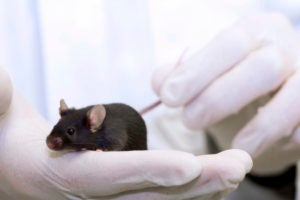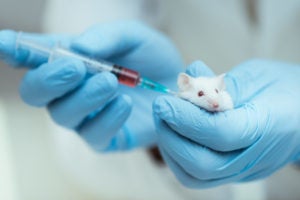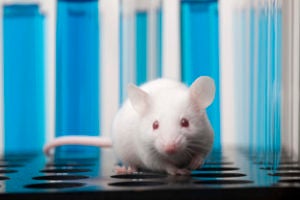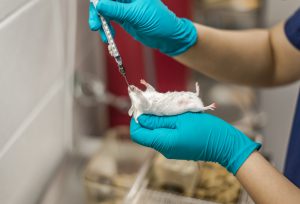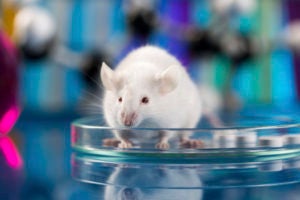
SEOUL (July 30)—With South Korea’s National Assembly set to review a bill to promote non-animal research methods later this year, a new opinion poll reveals that the majority of the Korean public want to see their tax money spent on supporting these advanced approaches instead of animal testing. Almost 82% of respondents want to see the 21st National Assembly session demonstrate legislative support for alternatives to animal testing, which includes approaches such as human organ-mimics and tests using human-derived cells instead of experiments on mice, monkeys and dogs.
The nationwide opinion poll conducted by independent polling company Realmeter, and commissioned by Humane Society International/Korea, comes just a month after official statistics published by the Ministry of Agriculture, Food and Rural Affairs revealed a total of 3,712,380 animals used for testing in 2019. The statistics showed an alarming 187% increase in animal use for testing insecticides, a 115% increase in the number of animals used to test industrial chemicals, a 77.8% increase in animal experiments in education and training, a 40% increase in pharmaceutical quality control animal testing, and a 9.7% increase in animal experiments in the most severe pain category.
South Korea’s high level of animal use persists despite efforts by many Korean scientists to rapidly develop human-relevant methods. Unfortunately, even internationally recognised non-animal methods are not well promoted by government or industry. The majority of laboratories in South Korea certified as “Good Laboratory Practice” by the Ministry of Environment still use animals even where internationally recognized alternatives are readily available, and few of Korea’s contract testing facilities even offer non-animal test options.
Borami Seo, Humane Society International/Korea’s senior policy manager for research and toxicology, said, “South Korea’s scientists are at the forefront of efforts to develop superior non-animal methods to better understand and treat human disease faster and more effectively. And yet without a legal framework to promote the use of these methods, they are all too often being ignored. Among other achievements, South Korean companies have developed a human cornea model to replace animal testing for eye irritation that has been accepted as an official test method by the Organisation for Economic Cooperation and Development; are incorporating gene editing technology into human cell-based models for drug screening for Wilson’s disease; and are establishing human organ-mimetic models to develop next-generation 3-D cell technology for drug development. Yet despite all this innovation, Korea’s regulatory framework is still biased towards the old ways of animal testing, which isn’t benefiting animal welfare or human health. That has to change.”
Summary of poll results
- 83.4% agree that the Korean government should increase funding to support animal testing replacement;
- 81.3% want to see their tax money spent to support studying non-animal methods using human organ mimetic approaches or human-derived cells;
- 83.8% support increased cross-ministerial collaboration to expand research fund for alternatives to animal testing;
- 81.6% support anticipated legislation to promote alternative research instead of animal testing during this new 21st session of National Assembly;
- 66% agree that testing that inflicts pain on animals needs to improve to avoid animal suffering;
- 76.9% were not aware of alternatives to animal testing being available that are more predictive and modern than using animals.
South Korea’s failure to embrace the full potential of non-animal methods stands in stark contrast with countries, such as the Netherlands, Belgium and the United States, where there is a concerted effort to eliminate the use of animals to test chemicals, pesticides and other products. In January 2017, the Dutch government announced plans to phase out animal use for chemical safety testing by 2025, and is on track to achieve this goal. Belgium’s Brussels-Capital Region banned animal testing on cats, dogs and primates effective January 2020, and by January 2025 it will also ban animal use in education and safety testing unless deemed absolutely necessary. And in September 2019, the US Environmental Protection Agency made a commitment to reduce mammalian testing requirements by 30% by 2025 and to completely eliminate them by 2035.
Last month, HSI and Assembly member In-soon Nam co-hosted an Assembly forum to discuss legislation to promote non-animal research techniques in safety and biomedical sciences, ‘the Act on the Promotion of Development, Distribution and Use of Alternatives to Animal Testing Methods’. Participants from the Ministry of Food and Drug Safety, the Ministry of Health and Welfare, the Korea Institute of Toxicology, the Korean Society for Alternative to Animal Experiments, Dana Green Bio, as well as legal experts from the National Assembly’s Legislative office, the Korea Legislation Research Institute and the Korean lawyers’ group People for Non-Human Rights, agreed on the need for a new research regulatory framework in Korea.
HSI/Korea’s Borami Seo said, “The future of scientific research lies in state-of-the-art, non-animal approaches like human organoids, organs-on-chips and next-generation computing and AI, not in poisoning, dissecting or genetically modifying mice, monkeys and other animals. This new opinion poll clearly shows that the vast majority of Koreans agree that the government should be taking serious action to advance the use of non-animal approaches. It’s time Korea followed the example of the United States, the Netherlands and other innovation economies that have made a serious investment in non-animal technologies. It’s been six decades since the concept of non-animal testing was introduced to the scientific community and yet animal use in Korean laboratories remains unacceptably high. We urge our government to become a global leader in non-animal science not only to protect animals from suffering, but also to accelerate more effective and predictive product safety and medical research for the benefit of the public.”
ENDS
Media contact: Borami Seo, bseo@hsi.org
Notes:
The nationwide poll of 1,000 respondents age 19 and older was conducted in June 2020 using an automated telephone survey method. Margin of error is ±3.1% with the 95% prediction interval.

